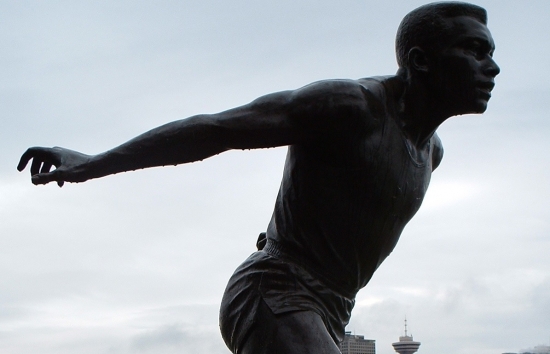CELEBRATING BLACK HISTORY MONTH - HARRY JEROME

BLACK HISTORY MONTH
During Black History Month, we celebrate and recognize the achievements of Black Canadians who have helped to shape our country. Carter G. Woodson, a scholar often referred to as the father of Black History, lobbied for that the history of African Americans be remembered, so that they would not be forgotten and their relevance to society lost, introduced Black History week in 1926. Eventually, it was extended to the month of February, marking the shared birth month of Abraham Lincoln and the abolitionist Fredrick Douglas.
In Canada, Black History Month was first introduced by the Ontario Black History Society, and brought into legislation by one of the first Black Canadian women elected to the House of Commons, Jean Augustine, in 1996. In 2008, Black History month was first introduced as a motion by Senator Donald Oliver, the first Black Canadian man appointed to the Senate, and February was officially recognized as a month to celebrate the contribution of black Canadians.
We would like to take this moment to celebrate the various Black Canadian athletes who have help shape Canada both on and off the field of play.
HARRY JEROME
In 1912, John “Army” Howard, would break colour barriers to become the first Black athlete to compete in the Olympic Games. Remarkably, 48 years later this broken barrier would see sports transcended further by his grandson with Harry Jerome when he set a world record in the 100m.
Conceivably one of Canada’s most notable pioneers in sport, Harry Jerome ran 9.9 seconds at the age of 19. However, because the world record time was 10 seconds at the time, the officials could not believe his result and rounded his time up to equal the world record time.
As one of only a few Black athletes competing for Canada at the time, Harry Jerome endured harsh criticism and racism. When he attended the Olympic Games in 1960 and failed to deliver a gold medal, the Toronto Telegram wrote, “the effect of his sheer bad manners has placed this young Negro down at the bottom as an athlete ambassador for Canada.” Despite this, he would go onto eventually win a bronze in the 100m at the Olympic Games, the first medal for any Black Canadian, and go onto win a gold medal at the Pan American and British Empire Games.
Perhaps what is most remarkable about Harry Jerome are the contributions he made to sport and Canadian society outside of track. He held a life committed to promoting the participation in sports. At the request of Prime Minister Pierre Trudeau, he helped form Canada’s new Ministry of Sport, and developed British Columbia’s Premier’s Sports Awards Program. Although, he passed away suddenly at the mere age of 42, he is remembered each year at the international world class track and field competition, the Harry Jerome Track Classic.
Awards and Recognition
- Seven world records
- Three-time Olympian
- 1964 Olympic Games Bronze medalist
- 1966 Commonwealth Games Gold medalist
- 1967 Pan American Games Gold medalist
- British Columbia Sports Hall of Fame inductee, 1966
- Canadian Amateur Athletic Hall of Fame inductee, 1971
- Canada’s Sports Hall of Fame inductee, 1971
- British Columbia Athlete of the Century, 1971
- Officer, Order of Canada, 1970
- Statue of Jerome unveiled at Stanley Park, Vancouver, 1988
- Canada’s Walk of Fame, 2001
Dr. Nicole Forrester
Olympian, Commonwealth Games Champion & 8-Time Canadian Champion
BLACK HISTORY IN CANADA
(from Government of Canada website)
People of African descent have been a part of shaping Canada’s heritage and identity since the arrival of Mathieu Da Costa, a navigator and interpreter, whose presence in Canada dates back to the early 1600s.
The role of Blacks in Canada has not always been viewed as a key feature in Canada’s historic landscape.
There is little mention that some of the Loyalists who came here after the American Revolution and settled in the Maritimes were Blacks, or of the many sacrifices made in wartime by Black Canadian soldiers as far back as the War of 1812.
Few Canadians are aware of the fact that African people were once enslaved in the territory that is now Canada, or of how those who fought enslavement helped to lay the foundation of Canada’s diverse and inclusive society.
Black History Month is a time to learn more about these Canadian stories and the many other important contributions of Black Canadians to the settlement, growth and development of Canada, and about the diversity of Black communities in Canada and their importance to the history of this country.











